How to Find a Good Sportsbook

A sportsbook is a place where people can make bets on various sporting events. The main objective of a sportsbook is to accept bets from customers and pay out winning wagers. The sportsbooks earn money by charging a fee, which is known as the juice or vig. A good sportsbook is one that offers fair odds and pays out winning bets quickly. It is also important to find a sportsbook that has a good reputation.
When deciding on a sportsbook, it is important to read independent reviews and customer feedback. In addition, it is vital to ensure that the sportsbook treats its customers fairly and has secure security measures. It should also be easy to use and have efficient payout methods.
The betting market for an NFL game begins to take shape almost two weeks before kickoff. Each Tuesday, a handful of sportsbooks release the so-called “look ahead” lines, which are intended to give sharp bettors an idea of what to expect in the next week’s games. These opening lines are often based on the opinions of just a few smart sportsbook managers, and their limits are usually a thousand bucks or so, well below the amount that most professional bettors would risk on a single pro football game.
A number of factors influence the final line that a sportsbook posts, including player performance, injury data, weather forecasts, and other relevant information. The odds are then compiled using a computer algorithm that calculates the expected probability of a team or individual winning, and then multiplied by the amount of money that a bettor is willing to risk on that outcome. The resulting number is then converted to a decimal point, and the resulting odds are published on the sportsbook’s website or mobile app.
Many states have legalized sportsbooks and are now offering a variety of different sports betting options. However, despite their claims to be regulated and taxed, most of these sites aren’t doing enough to protect consumers from fraud. One example of this is the practice of running sportsbook ads on TV at times when children may be watching, which could lead them to believe that they are allowed to place bets.
Another problem with state sportsbooks is that they aren’t properly educating customers about the risks of gambling. For instance, they don’t adequately explain the differences between fixed-odds betting and parlays, which are much riskier than straight bets. This lack of education is especially harmful to young people, who are likely to be the most frequent gamblers.
Although the majority of sportsbooks offer fixed-odds betting, the industry as a whole is primarily focused on parlays, which allow bettors to win a large sum by combining multiple bets into a single parlay. While these bets are more complicated than straight bets, they can yield significant profits if placed correctly. Nevertheless, there are some key differences between fixed-odds and parlays, which should be understood by all bettors before placing a bet.